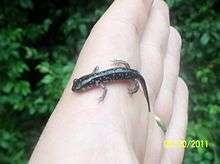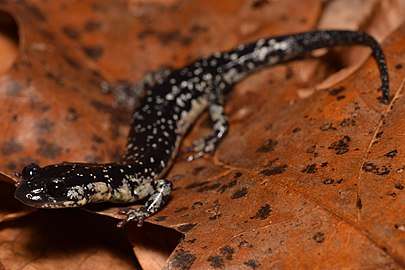Cumberland Plateau salamander
The Cumberland Plateau salamander (Plethodon kentucki) is a species of salamander in the family Plethodontidae endemic to the United States. Its natural habitat is temperate forests. It is threatened by habitat loss.
| Cumberland Plateau salamander | |
|---|---|
 | |
| Taken by Nicklos Clay Miller of Eastern Kentucky | |
| Scientific classification | |
| Kingdom: | Animalia |
| Phylum: | Chordata |
| Class: | Amphibia |
| Order: | Urodela |
| Family: | Plethodontidae |
| Subfamily: | Plethodontinae |
| Genus: | Plethodon |
| Species: | P. kentucki |
| Binomial name | |
| Plethodon kentucki Mittleman, 1951 | |

Description
A medium to large sized terrestrial Plethodontid salamander which is similar in appearance and life history to the Northern slimy salamander, which it is sympatric with. The Cumberland plateau salamander was first described in 1951,[2] but the validity of the species was questioned in 1955[3] until it was validated in 1983.[4] This species likely hybridizes with Plethodon glutinosus, hybridization is common with other members of the slimy salamander complex.[5]
Distribution
Found in the Cumberland plateau in eastern Kentucky, western West Virginia, northern Tennessee and western Virginia, the species is not found east of the Kanawha and New rivers.[1]
References
- "IUCN Red List Plethodon kentucki". IUCN Red List of Threatened Species.
- Mittleman, Myron (1951). "Two new salamanders of the genus Plethodon". Herpetologica. 7 (3): 105–112.
- Clay, William; Case, B; Cunningham, R (1955). "On the taxonomic status of the slimy salamander Plethodon glutinosus(Green), in southeastern Kentucky". Trans Kentucky Acad Sci. 16: 57–65.
- Highton, Richard; MacGregor, John (1983). "Plethodon kentucki Mittleman: a valid species of Cumberland Plateau woodland salamander". Herpetologica: 189–200.
- Kuchta, SR; Brown, AD; Converse, PE; Highton, R (2016). "Multilocus Phylogeography and Species Delimitation in the Cumberland Plateau Salamander, Plethodon kentucki: Incongruence among Data Sets and Methods". PLoS ONE. 11 (3): e0150022. doi:10.1371/journal.pone.0150022. PMC 4790894. PMID 26974148 – via https://dx.doi.org/10.1371/journal.pone.0150022.
